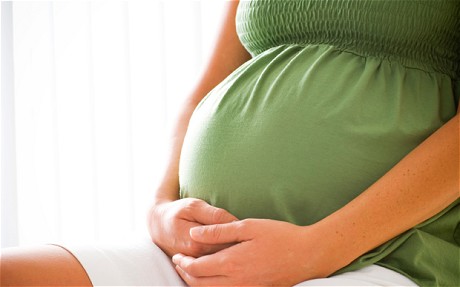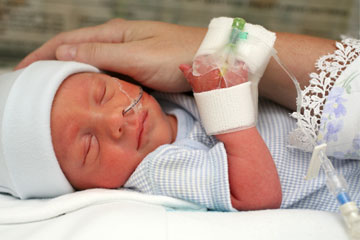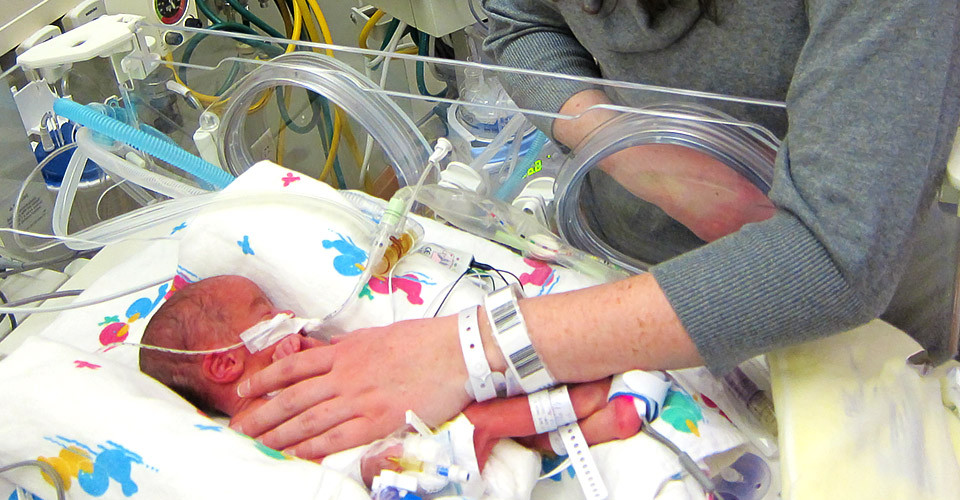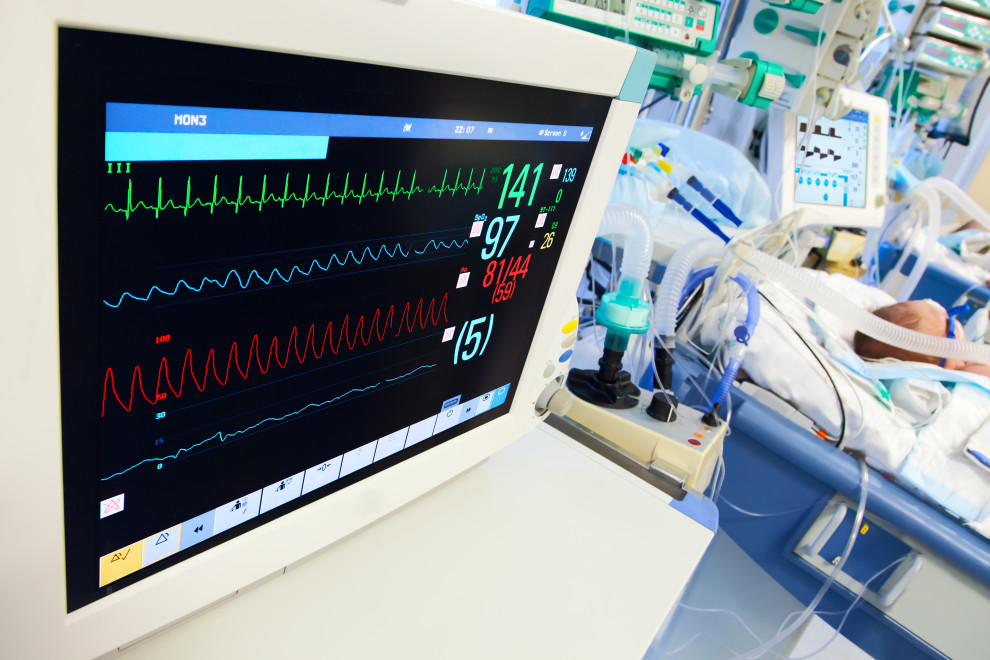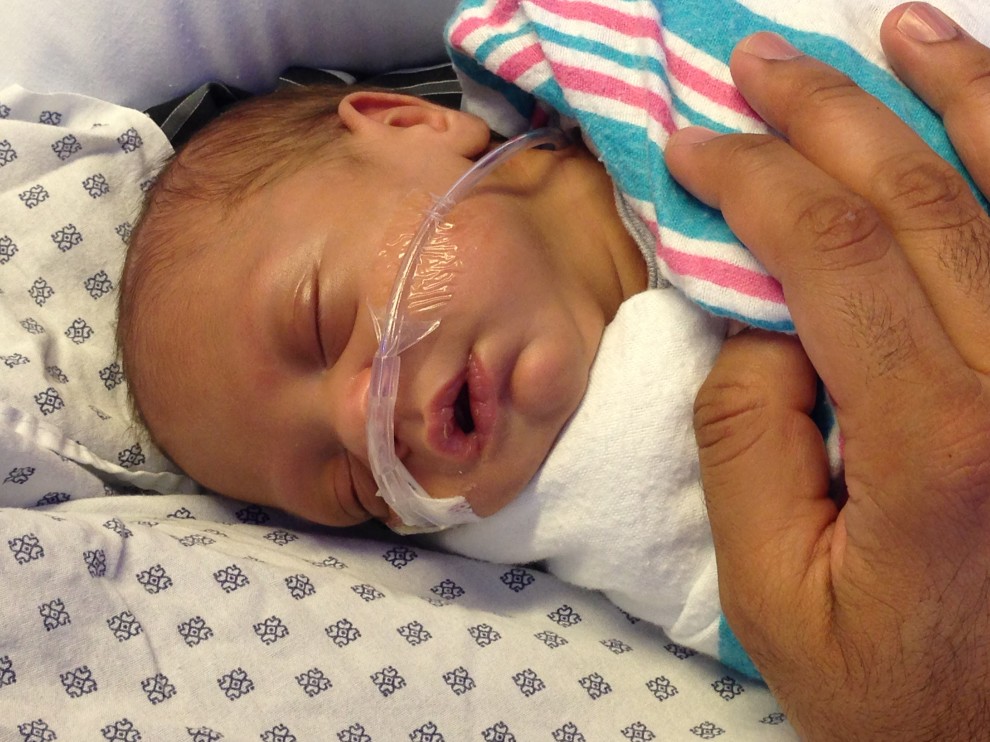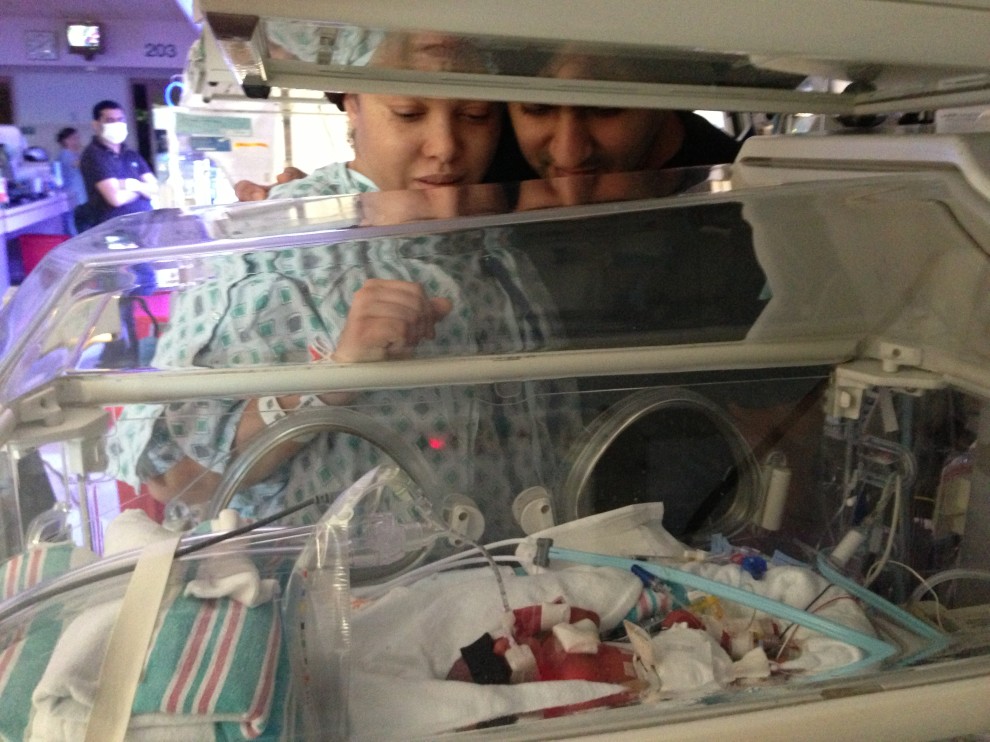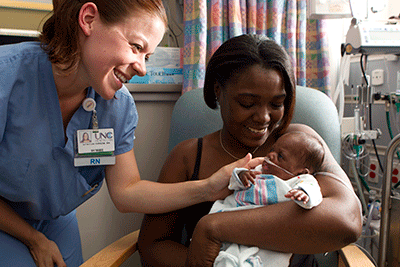By Gigi Khonyongwa-Fernandez
It is no secret to parents of babies born early and/or sick that the NICU is abnormal – not matter how much the doctors and nurses try to make it feel as normal as possible for its distraught parents. It is a surreal environment with different, almost otherworldly, rules of its own. Parents adhere to these rules which can include such things as:
- Only being able to touch their child through little portals in the incubator
- Watching their baby hooked up to every sort of apparatus imaginable
- Being constantly surrounded by lights, monitors and alarms
- Seeing their baby cry a sound-less cry because he/she is ventilated
- Mothers pumping their milk and feeding this milk to their baby via a syringe
- Watching their baby being rolled away for yet another potentially life-saving surgery all the while knowing that it may very well take his life
These rules are an incredible shock to the system – and yet somehow, someway parents tend to find a way to adapt and survive the many days, weeks and sometimes months in this strange world. When they finally go home, many parents find that the very thing they envisioned as being the end of a long journey (i.e. leaving the NICU) is in many ways only the beginning.
In this article, I would like to share with you a few of the common challenges parents of premature and/or sick babies tend to face after they have left the NICU as well as some tips on how they can begin to effectively cope with each one. Bear in mind that not every single issue will be addressed because just like every baby born prematurely and/or sick is different (how many times have you heard that?), every parent and the manner in which they cope is just as different.
NICU Separation Anxiety: After spending several weeks/months in the NICU, “D-Day” (Discharge Day) is finally here and parents can hardly contain their excitement. Sitting alongside their feelings of euphoria though are also very real feelings of fear. Parents ask themselves questions like, ‘Can I really take care of this baby?’ Do I know what I am doing?’ ‘What if something bad happens?’ After being surrounded by the safety and expert knowledge/skills of the NICU doctors and nurses in hospital, parents feel utterly lost and afraid now that they have their child on your own.
Tip: The key thing for parents to remember is to trust themselves. During their time in the NICU, parents had an in-depth crash course in how to take care of their child and from the moment they stepped into the NICU, they were learning, albeit unconsciously at times. Eventually parents learned when to be concerned and when not to be and most importantly, they learned to look at their baby, as this often told them more than any monitor could. Their intuition proved to be very valuable and parents frequently provided that link of continuity between all of the NICU nurses, doctors and specialists involved in their child’s care. At home, parents need to continue to couple the real knowledge they acquired in the NICU with their own parental intuitiveness and innate understanding of their baby. Parents already know the what, when and how of caring for their little one.
Medical Avalanche: Even though they are at home, many parents continue to be intimately connected with the medical profession and feel like they and their babies are still in the hospital. This is because many babies continue to have ongoing medical issues that require constant monitoring and/or treatment intervention. These can range from apnea and feeding and/or digestive issues to breathing and cognitive issues. Many babies go home with oxygen, apnea monitors, NG and/or peg tubes, etc. and almost all come home on some type of medication. A lot of babies require frequent, often weekly, hospital/clinic visits and follow-ups, especially during the initial days/months after the NICU. For babies with more complex needs, home nurses can become the family’s live-in guests. Yet despite having the support of these home nurses, many parents can continue to feel completely overwhelmed and snowed under by the medical assistance their child still requires.
Tip: To steal the concept from the famous Serenity Prayer – Manage the things you can, let go of the things you can’t – and know the difference. Parents: let the health professionals do their job with your little one (s) and you do your job as mummy/daddy. I am not implying that parents don’t remain vigilant regarding their baby’s care – to the contrary – but I’m just saying do not lose sight of your primary and most important role – that of loving parents. I cannot stress this enough. Too many parents continue to ‘look at the monitors’ even when they come home, rather than looking at and playing with their babies. It is when we can stop this very understandable practice, that we begin to truly start seeing and really parenting our little ones.
Developmental Concerns: Some parents will know prior to leaving the NICU that their child has some developmental issue and/or special need, i.e. cerebral palsy, Down syndrome, cystic fibrosis, etc. For many others, it maybe unknown diagnostically, but even in this case, parents usually have a strong and innate ability to know when something may not be quite right. They notice such things like their child not looking at them directly, not holding up his head or sitting up, not appearing to notice if a pot crashes suddenly to the floor, or just that their child acts a bit funny/differently to his peers. In both instances, the shock, weight and anxiety of this reality and/or potential reality can be crushing for parents. Concern for how they as parents can/will cope as well as how their children will cope is a constant worry.
Tip: Know that it is ok to feel crushed because your hopes and dreams for your child are not panning out to be like you had imagined. In some ways it is similar to the grieving process – and parents grieve the thought of what could have been. This acknowledgment of these feelings is vital. It is also important for parents to remember that although their child’s life may be different to what they had envisioned, it is still a pretty special life. Parents should seek out help and support at the first sign of a problem so that intervention can begin promptly. Services such as Early Invention can help your child in his overall development. Trust your intuition and get help, when needed.
Relationship Disconnect: This is a sensitive but key area to discuss. Having a child born early or sick is physically, emotionally, spiritually and financially exhausting from day one and it often continues once you are home. The time in the NICU required such a strong focus on their baby, that many parents forgot their own personal and couple needs. The sheer exhaustion and trauma of the NICU– if not discussed and dealt with in a timely manner – can lead to separation and divorce for many couples or at the very least, create a major point of contention in the relationship. “Recent research has shown that anxiety levels in mothers of premature babies are higher than mothers of term babies, at both 14 days and 14 months after delivery. [This leads] many parents, especially mothers [at a higher risk of experiencing] depression, anxiety and post-natal stress disorder (PTSD). Parents of preemies [also] have….feelings of fear, helplessness, grief and loss of the ‘perfect pregnancy’, even after their baby is out of danger and [is] thriving.”(Bliss, Counseling Service, UK).
Tip: This time in the parent’s lives can either be a stepping stone or a stumbling block in their relationship. It will very much depend on how they approach the situation. If appropriate, seek professional marital help. In addition and/or in lieu of this, it is crucial for both parents to remember that they have lived and are living this experience together and that they are both on the same team. Nobody else, not their parents, siblings, friends, etc. – can truly know or understand the minute-by-minute life in the NICU or the persistent concerns and tasks parents have once coming home. Parents have lived it, felt it, wept, laughed, worried, etc. together and are continuing to do so. There is no need to explain the NICU experience or its after-effects, to one another. Parents should capitalize on this wealth of ‘togetherness’ that only the two of them share. It can often be one of their greatest strengths as they go through the daily routines and challenges of their after-NICU life.
Gigi is the mother of an ex-24 week preemie and Founder of Families Blossoming LLC
Professional Coaching for Preemie and Special Needs Parents and Organizations
Email: gigi@familiesblossoming.com
Website: www.familiesblossoming.com


